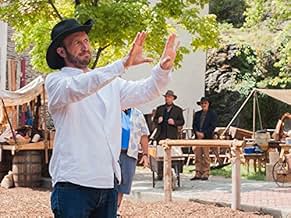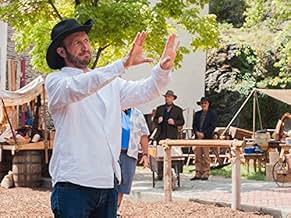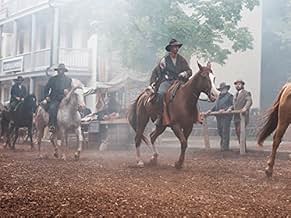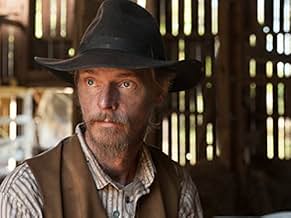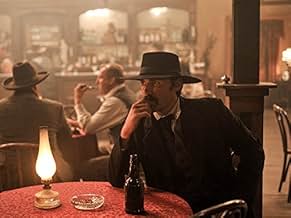CALIFICACIÓN DE IMDb
7.4/10
1.8 k
TU CALIFICACIÓN
Una revisión a gran escala de las historias de la frontera americana.Una revisión a gran escala de las historias de la frontera americana.Una revisión a gran escala de las historias de la frontera americana.
- Premios
- 1 nominación en total
Explorar episodios
Opiniones destacadas
This mini-series produced by Robert Redford puts together some of the most iconic figures and events in the old American West highlighted by Jesse James, Billy the Kid, Wyatt Earp, George Armstrong Custer, Crazy Horse, and Sitting Bull starting from the end of the Civil War to the Oklahoma land rush some 25 years later. It ends with a surprising final connection between Wyatt Earp and John Wayne. The recreations are compelling enough and expertly made for a TV production. The actors portraying the historical figures are relative unknowns. In fact, the series use a mix of historians and much more famous actors as talking heads to explain the significance of the events. As for its history educational value, this show cherry-picks the most compelling stories of the most compelling characters. It lays it out in order which gives the widely known stories their proper place in the chronological order. This helps to give them context and a surprisingly effective flow. It is able to paint a vast epic picture of a changing world.
For me and for most Americans there is nothing more interesting than the story of the West. From the Civil War until World War 1, the West was full of adventure, opportunity, drama and tragedy. AMCs series "Hell on Wheels" was an excellent attempt to portray one aspect of this period, the building of the railroads. But their far more ambitious "The American West" is a big disappointment on a number of levels.
For a documentary, the use of "expert" opinion from movie stars is hardly a good idea. Have we stooped so low that we get our history from movie stars?
Perhaps the reliance on movie stars for the primary documentation is one of the reasons this 8 part series has so many errors (e.g., Jesse James and Billy the Kid met, Wyatt Earp went to Tombstone to be their Sheriff).
Another weakness of the series is that there is no real underlying theme. There are brief episodes about Jesse James (Missouri), Billy the Kid (New Mexico), Wyatt Earp (Kansa and Arizona), and Custer and Sitting Bull (the Dakotas). But there is no real glue that holds the episodes together (e.g., the demands of capitalism to obtain natural resources, the political post war climate, the economic problems and the challenges of currency, etc.)
Telling the story of the West is an important project, but this series fails to do it in a meaningful way. FWIW - I really like the TV series "Centennial" (1978-79) and "Hell on Wheels" (2011-16). They both gave a comprehensive history of the West and did so in a more entertaining manner. For sheer pleasure, "Pat Garrett and Billy the Kid" (1973) is my favorite telling of this story.
For a documentary, the use of "expert" opinion from movie stars is hardly a good idea. Have we stooped so low that we get our history from movie stars?
Perhaps the reliance on movie stars for the primary documentation is one of the reasons this 8 part series has so many errors (e.g., Jesse James and Billy the Kid met, Wyatt Earp went to Tombstone to be their Sheriff).
Another weakness of the series is that there is no real underlying theme. There are brief episodes about Jesse James (Missouri), Billy the Kid (New Mexico), Wyatt Earp (Kansa and Arizona), and Custer and Sitting Bull (the Dakotas). But there is no real glue that holds the episodes together (e.g., the demands of capitalism to obtain natural resources, the political post war climate, the economic problems and the challenges of currency, etc.)
Telling the story of the West is an important project, but this series fails to do it in a meaningful way. FWIW - I really like the TV series "Centennial" (1978-79) and "Hell on Wheels" (2011-16). They both gave a comprehensive history of the West and did so in a more entertaining manner. For sheer pleasure, "Pat Garrett and Billy the Kid" (1973) is my favorite telling of this story.
I don't usually judge these historically based old west shows until they get to the Lincoln County War. I'm not a historical expert by any means, but I have read and seen just about everything there is on the Lincoln County War. It's a bit of an obsession of mine.
I really like this mini-series, but was very disappointed in the historical accuracy of it. I could go into a lot of detail about it but I'll just mention a few things.
They presented John Tunstall as if he were some older ranch man. Tunstall died at the age of 24 and was British. Not showing that kind of surprised me because it left out a major point of the story. The house was more or less run by Murphy and Dolan (who they never even mentioned for some reason), and they were Irish. So there was a great deal of tension between the two sides just because one was Irish and one was British.
Also, there is literally more evidence that the Loch Ness Monster exists than there is that Billy the Kid met with Jesse James. Yet this show presents it as if it were fact.
Also the depiction of the Big Killing was very disappointing. It seems to me they tried to make it more like Young Guns rather than trying to make it historically accurate. The didn't show the house being put ablaze, and they made it look like it took place in an afternoon when in reality it spanned over 4 days and Billy and a few others escaped at night.
I also don't know how you talk about Earp and Dodge City and leave out Bat Masterson. Small detail, but I also noticed that when they were talking about Las Vegas, New Mexico they shoved a photo of the dead Dalton Gang from Coffeyville in there, like it happened in New Mexico?
Anyway I give this a 4 out of 10 for historical accuracy and an 8 for entertainment, so I met in the middle and gave it a 6. Fun to watch, but if you're looking for accuracy look for better documentaries.
I really like this mini-series, but was very disappointed in the historical accuracy of it. I could go into a lot of detail about it but I'll just mention a few things.
They presented John Tunstall as if he were some older ranch man. Tunstall died at the age of 24 and was British. Not showing that kind of surprised me because it left out a major point of the story. The house was more or less run by Murphy and Dolan (who they never even mentioned for some reason), and they were Irish. So there was a great deal of tension between the two sides just because one was Irish and one was British.
Also, there is literally more evidence that the Loch Ness Monster exists than there is that Billy the Kid met with Jesse James. Yet this show presents it as if it were fact.
Also the depiction of the Big Killing was very disappointing. It seems to me they tried to make it more like Young Guns rather than trying to make it historically accurate. The didn't show the house being put ablaze, and they made it look like it took place in an afternoon when in reality it spanned over 4 days and Billy and a few others escaped at night.
I also don't know how you talk about Earp and Dodge City and leave out Bat Masterson. Small detail, but I also noticed that when they were talking about Las Vegas, New Mexico they shoved a photo of the dead Dalton Gang from Coffeyville in there, like it happened in New Mexico?
Anyway I give this a 4 out of 10 for historical accuracy and an 8 for entertainment, so I met in the middle and gave it a 6. Fun to watch, but if you're looking for accuracy look for better documentaries.
This review is based on the version shown in Europe under the title "Robert Redford's The West". I'm not aware of any differences apart from the title and I'd be surprised if there were given the skimpy production values of the series. The series of eight one-hour shows sets out to tell the tale of the West through six lives Custer, Crazy Horse and Sitting Bull, Jesse James, Billy the Kid and Wyatt Earp. We get a narrative over reenactments interspersed with to-camera pieces from lots of actors who appeared in Westerns and some actual historians. I found the series very disappointing. The recreation of the Little Big Horn would embarrass a troop of amateur re-enactors. More substantial is the myriad inaccuracies and omissions. In telling the tale of the James brothers I don't recall a mention of the Younger Brothers. We're shown a map of the Battle of the Little Big Horn that shows Reno's and Custer's advances but doesn't show Benteen's nor is he mentioned in the narrative. Billy the Kid's escape all happens on the ground floor. There's no Pete Maxwell in Pete Maxwell's bedroom when Billy is shot. The viewer is given no context as to why either man was in the room (the link being Maxwell). As presented Morgan and Virgil Earp are shot on the same night. Others more knowledgeably than myself have and could point out many more flaws in the series. Did I learn anything? Yes. A young John Wayne met an elderly Wyatt Earp.
"From the ashes of the Civil War", comes a period of rapid settlement of the American West. Much of the West was controlled by tribes of Indians, but it offered one solution to the festering resentment and conflicts that followed the war.
Also, there were some rebel soldiers who continued to fight against Northern supremacy and order. Jesse James and his gang began to terrorize and strike at Northern interests.
This is how "The American West"--an eight part series executive produced by Robert Redford--begins. With voice overs and reenactments, the show details the beginnings of what becomes a two-front war that General Grant wages from Washington.
The credentials of the historians who add their remarks are impressive. There certainly is a wealth of academic inquiry available to the makers of this show. Still, this is a true story that seems to be painted with a broad brush. And it does not answer some key questions about the motivations and actions of some of the actors in this vast drama.
It does, however, establish a basic framework that viewers can build upon with personal reading and further scholarship. As always, history is a complex matter, and the outline provided by this series leaves plenty of room for a more refined understanding.
Also, there were some rebel soldiers who continued to fight against Northern supremacy and order. Jesse James and his gang began to terrorize and strike at Northern interests.
This is how "The American West"--an eight part series executive produced by Robert Redford--begins. With voice overs and reenactments, the show details the beginnings of what becomes a two-front war that General Grant wages from Washington.
The credentials of the historians who add their remarks are impressive. There certainly is a wealth of academic inquiry available to the makers of this show. Still, this is a true story that seems to be painted with a broad brush. And it does not answer some key questions about the motivations and actions of some of the actors in this vast drama.
It does, however, establish a basic framework that viewers can build upon with personal reading and further scholarship. As always, history is a complex matter, and the outline provided by this series leaves plenty of room for a more refined understanding.
¿Sabías que…?
- TriviaSome of the stock footage is from Brisco County Jr.
- ConexionesFeatured in History Buffs: Casino (2019)
Selecciones populares
Inicia sesión para calificar y agrega a la lista de videos para obtener recomendaciones personalizadas
- How many seasons does The American West have?Con tecnología de Alexa
Detalles
Contribuir a esta página
Sugiere una edición o agrega el contenido que falta

Principales brechas de datos
By what name was El Oeste de Robert Redford (2016) officially released in Canada in English?
Responda
